National Hockey League (1972-1980)
Tombstone
Born: November 9, 1971 – NHL expansion franchise
Moved: May 23, 1980 (Calgary Flames)
First Game: October 7, 1972 (W 3-2 @ New York Islanders)
Last Game: April 12, 1980 (L 5-2 vs. New York Rangers)
Stanley Cup Championships: None
Arena
The Omni
Opened: 1972
Demolished: 1997
Marketing
Team Colors:
Ownership
Owner: Tom Cousins
Our Favorite Gear
Atlanta Flames Replica Jersey
When it comes to Replica Jerseys, we turn to our friends at Royal Retros, who put extraordinary detail into their fully customizable hockey sweaters.
Free Customization Included
Each jersey individually handmade
Any name and number
Heavyweight sewn tackle twill
100% polyester
Heavyweight fabric made to game standards
Fight strap included
When you make a purchase through an affiliate link like this one, Fun While It Lasted earns a commission at no additional cost to you. Thanks for your support!
Background
This was a good 1970’s NHL expansion team! Like really actually pretty good, all things considered. The Atlanta Flames had a winning record in five of their eight seasons as the NHL’s only Deep South outpost. They made the playoffs six out of those eight years. They had a core of outstanding young players and a future Hall-of-Fame executive in the GM chair.
But the collective memory of the Atlanta Flames is that they weren’t very good because they were God-awful in the playoffs (objectively true) and Southerners hate ice hockey (possibly true, definitely a well-worn trope).
The Atlanta-era Flames also may suffer by association with a frantic period of NHL expansion and relocation impelled by the league’s competition with the World Hockey Association, a rival league that debuted alongside the Atlanta Flames in the fall of 1972. But Atlanta was a much more competitive – and, for a time, popular – club than the NHL other 1970’s market failures in Cleveland, Denver, Kansas City and Oakland.
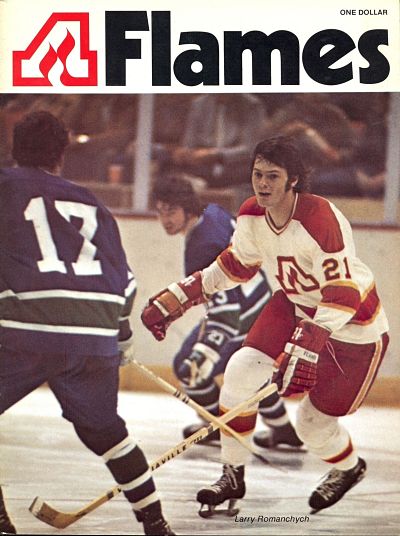
On The Ice
Atlanta General Manager Cliff Fletcher built a promising core through the NHL expansion and amateur drafts. The 1972 expansion draft to stock the Flames and New York Islanders franchises brought the goaltending duo of Dan Bouchard and Phil Myre. Bouchard would stay with the Flames through the entire Atlanta era and eventually move with the club to Calgary. Myre stayed nearly as long, platooning with Bouchard for Atlanta’s first five seasons.
Atlanta held the #2 overall pick in both the 1972 and 1973 NHL amateur drafts. 1972 #2 selection Jacques Richard never found his form and was gone by 1975. But the 1973 draft was a bonanza for the Flames. Fletcher nabbed Center Tom Lysiak with Atlanta’s first round selection and grabbed big left wing Eric Vail in the second round. Lysiak would become Atlanta’s all-time leading point scorer (431) while Vail emerged as the franchise’s Atlanta-era goal scoring leader (174).
The 1972-73 expansion squad acquitted itself well. The Flames carried a winning record past midseason before late slump brought the season to a close at 25-38-15. By contrast, the NHL’s other 1972 expansion side, the New York Islanders, finished with an awful 12-60-6 mark. But it was the Islanders, not the Flames, who would emerge as an NHL dynasty within their first decade.
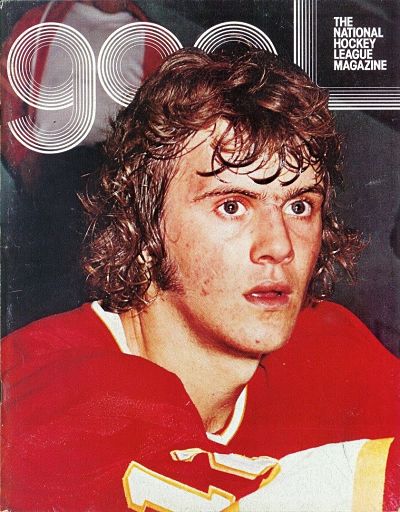
Postseason Flame-Outs
The Flames made the playoffs for the first time at the end of their second season in the spring of 1974. They were swept 4-0 by in the Philadelphia Flyers, inaugurating an epic stretch of playoff misery that would last for the rest of the decade.
The regular season was another matter though. Fletcher continued to add outstanding players through the amateur draft including Guy Chouinard (1974), who would become the team’s first 50-goal scorer in 1979, Willi Plett (1975), the NHL’s 1977 Rookie-of-the-Year, and defenseman Paul Reinhart (1979). A key trade during the 1977-78 season brought high-scoring center Bob MacMillan from the St. Louis Blues in return for back-up goaltender Phil Myre. With the demise of the WHA in 1979, Fletcher poached 23-year old Swedish scoring phenom Kent Nilsson prior to Flames final season in Atlanta.
From 1975 to 1980 the Flames posted a winning or .500 record for six straight years. But the years 1976 to 1980 saw the Flames make five consecutive first-round exits in the Stanley Cup playoffs. They were swept in the three of those five series and compiled an horrific total playoff record of 2-15 during the team’s Atlanta years.
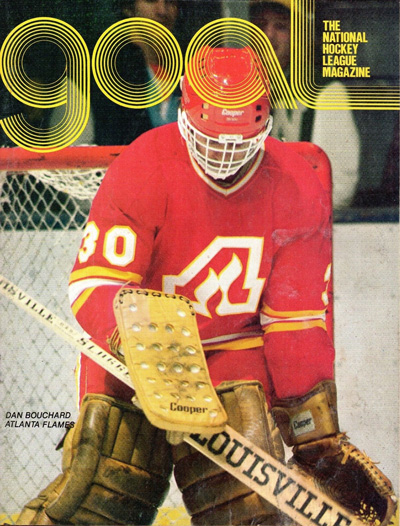
Financial Problems
The Flames suffered a series of financial setbacks throughout the 1970’s.
Team founder Tom Cousins, a Georgia developer who also owned the Omni Coliseum and the Atlanta Hawks at the time, extracted an unusual concession from the NHL in 1975. In return for agreeing to borrow money and keep the Flames in operation, Cousins negotiated for an exemption to the rule requiring unanimous approval of the NHL board of governors for relocation. During the 1970’s, the Flames were the only NHL club that could be moved to another city without such permission.
In December 1976, each Flames player reportedly agreed to cough up 1.5% of their salary to purchase and donate $25,000 worth of tickets. The purchase was part of a larger $750,000 campaign by Georgia Governor George Busbee to prop up the team.
Attendance declined throughout the decade from a peak of 14,162 per game in 1973-74 to a nadir of 10,024 in the final season on 1979-80. Several destinations were rumored for the team during the spring of 1980 including New Jersey and Texas, but lead horse was always Calgary, Alberta.
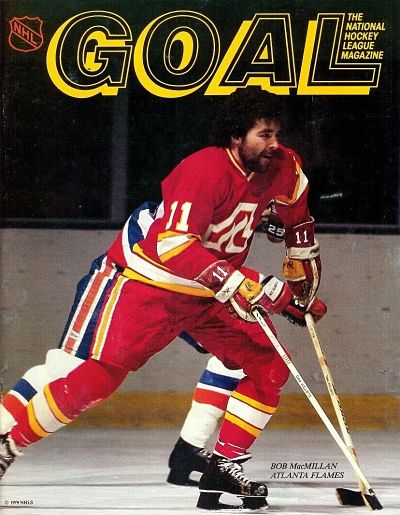
Move to Calgary & Aftermath
In the end, Cousins sold the Flames to Vancouver real estate tycoon Nelson Skalbania for $16 million in May of 1980.
Skalbania was a former World Hockey Association owner and the man who signed Wayne Gretzky to his first pro contract in 1978. But he also folded his WHA franchise, the Indianapolis Racers, in midseason just a few months after the Gretzky deal. In 1981, the year after purchasing the Flames, he engineered the spectacular collapse of the Canadian Football League’s venerable Montreal Alouettes club, which he wiped off the map in just a single disastrous year of management. Mercifully, Skalbania gradually sold off his interests in the Flames over the next year and was fully divested by late 1981. This insulated the Calgary Flames from Skalbania’s sensational bankruptcy the following year.
The Flames went on to win a Stanley Cup for Calgary in 1989. The club was still under the guidance of founding General Manager Cliff Fletcher, hired by Atlanta in their expansion season of 1972, at the time. Fletcher was elected to the Hockey Hall of Fame in 2004, the only member of the Atlanta-era Flames to earn the enshrinement.
In a 2018 interview with Jim Weathersby’s Sports Historian website, ex-Flames owner Tom Cousins cited several factors for the team’s failure in Atlanta. He named salary wars with the rival World Hockey Association, the Omni’s lack of luxury suites and a lack of television revenue as three crucial daggers to the Flames viability. Cousins sold the NBA’s Atlanta Hawks to Atlanta Braves owner Ted Turner in 1977. In the same interview, Cousins claims he offered the Flames to Turner as a “gift” in the same transaction, but the advertising and communication mogul declined the offer.
Our friends at the Good Seats Still Available podcast did an episode on the Atlanta Flames:
Atlanta Flames Shop
COMING SOON
Atlanta Flames Video
1979 Stanley Cup playoffs. Flames at Toronto Maple Leafs from Maple Leafs Gardens, April 12, 1979.
https://www.youtube.com/watch?v=2bQsxq2F62k
In Memoriam
Left wing Jacques Richard (Flames ’72-’75) died in a single-car accident on October 8, 2002 while returning home from his 50th birthday party. New York Times obituary.
Head Coach Bernie Geoffrion (Flames ’72-’75) passed away of stomach cancer on March 11, 2006. The Hockey Hall-of-Famer was 75 years old. New York Times obituary.
Head Coach Fred Creighton (Flames ’75-’79) died on September 28, 2011 of complications from Alzheimer’s Disease. He was 81 years old.
Center Tom Lysiak (Flames ’73-’79) died of leukemia on May 30, 2016. The Atlanta Flames’ all-time leading scorer was 63 years old. New York Times obituary.
Links
##

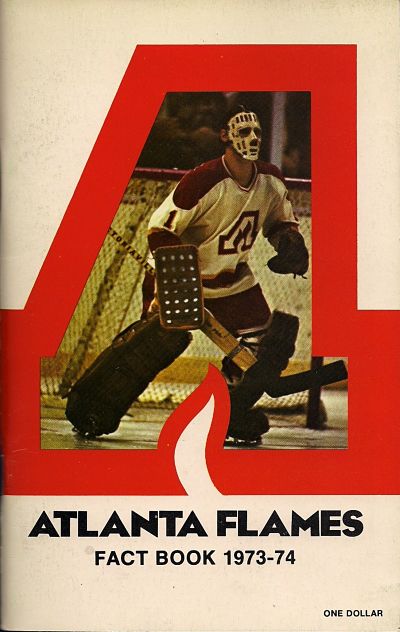
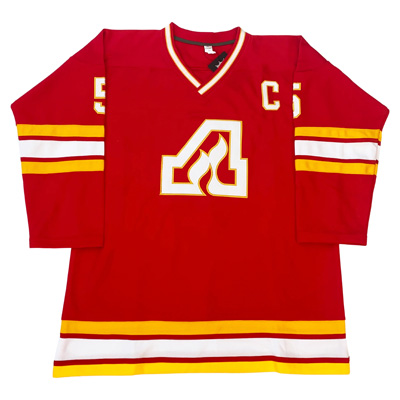
3 Responses
Awesome history Flames fan from 72 to today in Calgary.I have most of those programs and media guides from the days in Atlanta
Do you have any old videos of Fkames games on dvd or vhs? I’m always looking for old Flames vids, if you know anybody let me know, thanks
This is awesome for me because its been 40 years since the Flames left the N.H.L. I am Canadian and miss them very much. They were my favorite team and Bouchard and Lysiak,Plett were my favorite players. I’m glad that these and other players stayed in the area. The game is not the same to me as I followed these guys especially Dan.I was sad to see Tom pass away. The bucket list for me would be to visit Atlanta. Leslie.